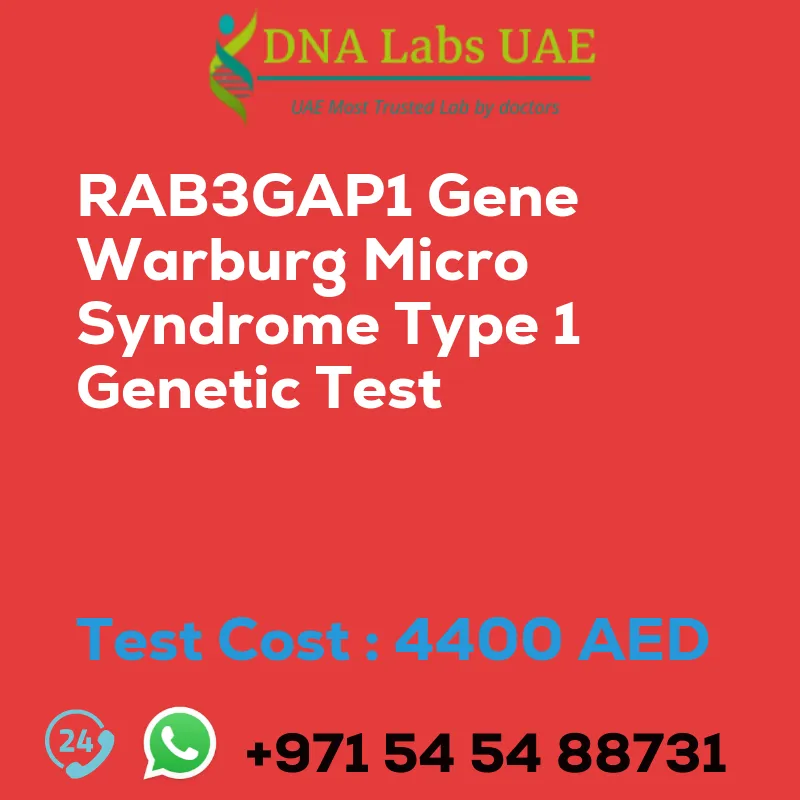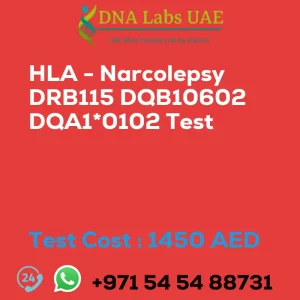RAB3GAP1 Gene Warburg micro syndrome type 1 Genetic Test
At DNA Labs UAE, we offer the RAB3GAP1 Gene Warburg micro syndrome type 1 Genetic Test at a cost of AED 4400.0. This test is used to diagnose individuals with Warburg micro syndrome type 1, a rare genetic disorder.
Test Details
The RAB3GAP1 gene is responsible for the production of a protein called RAB3GAP1, which is crucial for the development and functioning of the brain, eyes, and other organs. Mutations in this gene can lead to Warburg micro syndrome type 1.
Warburg micro syndrome type 1 is characterized by a combination of symptoms, including intellectual disability, developmental delay, microcephaly (small head size), severe visual impairment, and movement problems. Other features may include limb stiffness, joint contractures, and seizures.
NGS Technology
We use Next Generation Sequencing (NGS) technology for this genetic test. NGS allows us to analyze multiple genes simultaneously, making it easier to detect mutations or changes in the DNA sequence. In the case of Warburg micro syndrome type 1, NGS genetic testing helps identify mutations in the RAB3GAP1 gene that cause the disorder.
NGS genetic testing is useful for confirming a diagnosis of Warburg micro syndrome type 1 in individuals with clinical symptoms. It can also be used for carrier testing in individuals with a family history of the condition, as well as for prenatal testing in families at risk of having a child with the disorder.
Pre Test Information
Prior to undergoing the RAB3GAP1 Gene Warburg micro syndrome type 1 Genetic Test, it is important to provide the clinical history of the patient. Additionally, a genetic counseling session is recommended to draw a pedigree chart of family members affected by the disorder.
Our test is conducted by the Genetics department and is supervised by pediatricians. The sample required for the test can be either blood or extracted DNA, or one drop of blood on an FTA card.
Report Delivery
The report for the RAB3GAP1 Gene Warburg micro syndrome type 1 Genetic Test is typically delivered within 3 to 4 weeks.
It is important to note that genetic testing should always be done under the guidance of a healthcare professional or genetic counselor who can provide appropriate counseling and support throughout the testing process.
| Test Name | RAB3GAP1 Gene Warburg micro syndrome type 1 Genetic Test |
|---|---|
| Components | |
| Price | 4400.0 AED |
| Sample Condition | Blood or Extracted DNA or One drop Blood on FTA Card |
| Report Delivery | 3 to 4 Weeks |
| Method | NGS Technology |
| Test type | Dysmorphology |
| Doctor | Pediatrics |
| Test Department: | Genetics |
| Pre Test Information | Clinical History of Patient who is going for RAB3GAP1 Gene Warburg micro syndrome type 1 NGS Genetic DNA Test. A Genetic Counselling session to draw a pedigree chart of family members affected with RAB3GAP1 Gene Warburg micro syndrome type 1 NGS Genetic DNA Test gene RAB3GAP1 |
| Test Details |
The RAB3GAP1 gene is responsible for the production of a protein called RAB3GAP1, which plays a crucial role in the development and functioning of the brain, eyes, and other organs. Mutations in the RAB3GAP1 gene can lead to a rare genetic disorder known as Warburg micro syndrome type 1. Warburg micro syndrome type 1 is characterized by a combination of symptoms including intellectual disability, developmental delay, small head size (microcephaly), severe visual impairment, and problems with movement. Other features may include spasticity (stiffness) of the limbs, joint contractures, and seizures. NGS (Next Generation Sequencing) genetic testing is a method used to analyze multiple genes simultaneously, allowing for the detection of mutations or changes in the DNA sequence. In the context of Warburg micro syndrome type 1, NGS genetic testing can be used to identify mutations in the RAB3GAP1 gene that are responsible for the disorder. By identifying the specific genetic mutation causing the disorder, NGS genetic testing can help confirm a diagnosis of Warburg micro syndrome type 1 in individuals with clinical symptoms. It can also be used for carrier testing in individuals with a family history of the condition, as well as for prenatal testing in families at risk of having a child with the disorder. It is important to note that genetic testing should be conducted under the guidance of a healthcare professional or genetic counselor who can provide appropriate counseling and support throughout the testing process. |








